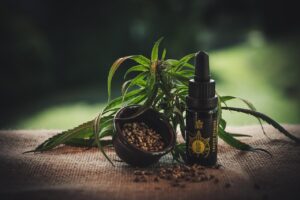At VidaCann, the well-being of our patients influences every decision we make. Everything from our state-of-the-art conservatories to our dedicated team of care specialists operates with one main objective—to help our patients live their healthiest lives.
So when we heard about the postoperative relief one of our patients found with our line of Tikun Olam medical cannabis products, we wanted to share his story in hopes that it would inspire and encourage others that have experienced similar issues. This is not a medical study nor should any part of it be taken as medical advice. This is a personal anecdote of one man’s experience with ulcerative colitis, corrective surgery, and medical marijuana.
One Patient’s Post-Op Journey with Tikun Olam Cannabis
Clark Michaels*, a decades-long Florida resident, father of two, and the subject of two major surgeries following an ulcerative colitis diagnosis, has been a VidaCann patient for about a year and a half. Before he joined us, he was hesitant to try medical marijuana to help with his surgery-related issues and, like many patients we work with, had to move past the negative stigma of cannabis before he was willing to consider it a viable medical option.
“Growing up, I didn’t really consume it,” Michaels said. “It was never really associated with anything medical, so it was hard for me to see it like that. Ultimately, I gave it a shot, and now I wonder if it could’ve helped me with my ulcerative colitis symptoms before I even had the corrective surgery.”
According to the Mayo Clinic, ulcerative colitis, or UC, “is an inflammatory bowel disease (IBD) that causes inflammation and ulcers (sores) in your digestive tract. Ulcerative colitis affects the innermost lining of your large intestine (colon) and rectum.” Symptoms include abdominal pain and cramping, diarrhea, rectal pain and bleeding, urgency to defecate, weight loss, fatigue, and fever. The cause of UC is unknown.
[1]
Michaels’ issues with UC started when he was 15. He described spending much of high school curled up on the bathroom floor in excruciating pain. Doctors gave him no more than a solution of “it will pass” and sent him on his way. Hoping “it will pass” was his only option for 25 years.
It wasn’t until 2000, at the age of 40, that he received an official diagnosis of ulcerative colitis. And not until 2004, after nearly passing out during a bike race from severe dehydration, that he underwent surgery to cure his UC.
The surgery, called proctocolectomy with ileal pouch-anal anastomosis, or more simply, J-pouch surgery, cured Michaels of UC by removing his colon and fashioning an internal pouch with the terminal end of his small intestine to function in its place. Although it cured him of his autoimmune disease, it left him with lifelong issues, particularly a proclivity to become clinically dehydrated very quickly.
With so much of the digestive system removed, his body now has trouble retaining food long enough for nutrients and electrolytes to be absorbed. Michaels has to be very careful with what and how he eats, making sure to include a lot of fiber and starting a couple meals a day with a psyllium husk supplement that absorbs liquid, in turn physically slowing down food on its way through his limited digestive tract. And this post-op life is also not without pouch infections, pain, grief, and exhaustion.
“It’s been a daily struggle to deal with the life-threatening consequences of my corrective surgery,” Michaels shared. “After the surgery, the mainline treatment option was a daily opiate to cope with the side effects of a very fast digestive process, and I refused to go there. So I suffered for 17 years. It wasn’t until a friend of a friend mentioned finding relief with marijuana that I even considered it. She shared some flower with me, and it completely changed my life.”
Michaels reflected that none of his doctors mentioned medical marijuana to him for his UC symptoms or his post-op side effects. (Although he clarified that, to be fair, Florida didn’t have a medical marijuana program during the time he was dealing with UC symptoms.) But after trying it on his own and noticing a near-instant deceleration in his digestion, he called his general practitioner to ask about it. The doctor confirmed what he experienced, noting that studies suggest THC has the ability to slow digestion throughout the gastrointestinal tract.
[2] Michaels quickly registered as a Florida medical marijuana patient. As he continued to explore THC and different VidaCann products, other benefits outside of slowing down his digestion became noticeable.
“After having success taking medical marijuana to support my surgically-modified digestive system, I noticed changes in other long-standing issues that were previously diagnosed as psyche issues,” Michaels explained. “I’d battled with ADD, depression, and intrusive thoughts for years. I was on psych meds for a decade, but after using cannabis, I was able to get off them completely. Now, I see no reason to go back unless needed for a panic attack or strong level of anxiety and I can’t get to my medical marijuana.”
Today, Michaels keeps Tikun Olam’s Erez and Or vapes by his bedside, and his fridge houses some Erez gummies and Alaska and Eran Almog tinctures. He’s been using at least two of those products nightly since he was introduced to Tikun Olam cannabis in February of 2021. In addition, he smokes Tikun Olam cannabis flower every afternoon to help him through the day. He clarified that it took some trial and error to figure out the right products and dosage for him, but he’s found his THC sweet spot and is now focused on exploring terpenes and the potential benefits they may offer.
Michaels acknowledged his confidence in Tikun Olam cannabis, saying, “Their approach has been scientific from the beginning. They spoke the language of my UC diagnosis, and they were started under the mentorship of the doctor who discovered THC and have maintained his integrity and approach. They were exactly what I was looking for.”
Although medical marijuana hasn’t cured his post-op issues, Michaels is happy to report they’re more manageable for him than they’ve ever been.
“My next step is to find more people like me. People who have suffered from UC or other gastrointestinal issues and their surgeries. I want to know how they’ve coped and share with them what I’ve experienced with Tikun Olam and medical marijuana in general. I hope to help make it a larger part of the UC conversation.”
*Names have been changed.
SOURCES








